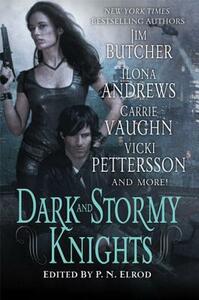You need to sign in or sign up before continuing.
Take a photo of a barcode or cover
86 reviews for:
Dark and Stormy Knights: A Paranormal Fantasy Anthology
Deidre Knight, Carrie Vaughn, Vicki Pettersson, Rachel Caine, Ilona Andrews, Lilith Saintcrow, Shannon K. Butcher, P.N. Elrod, Jim Butcher
86 reviews for:
Dark and Stormy Knights: A Paranormal Fantasy Anthology
Deidre Knight, Carrie Vaughn, Vicki Pettersson, Rachel Caine, Ilona Andrews, Lilith Saintcrow, Shannon K. Butcher, P.N. Elrod, Jim Butcher
A number of shorts stories. All were ok, some were quite good. I bought this originally because of the Jim Butcher short story, but found I really liked Even A Rabbit Will Bite by Rachel Caine. Benighted by Deidre Knight was also excellent.
I only read the story by [a:Ilona Andrews|21748|Ilona Andrews|http://photo.goodreads.com/authors/1219436898p2/21748.jpg]. It is a prequel to the Kate Daniels series. This is a story about her bodyguard gig with Saiman. It was a nice story. It was 45 pages , so not that long, but still an okay story.
I didn't read all the stories in this anthology, but for the most part enjoyed the ones I did read.
Even Hand by Jim Butcher- Set in the Dresden world, but a story from John Marcone's point of view. I really enjoyed this segue into a minor character- high marks.
The Beacon by Shannon Butcher- I quit reading this one half way through.
Even a Rabbit Will Bite by Rachel Caine- An odd little story, but very poignant. A solid 5 star for me.
Shifting Star by Vicki Pettersson- Another story featuring a minor character from a favorite series. This time it was Skamar from the Signs of the Zodiac series. Having read the latest a few months ago this story was especially touching.
Rookwood & Mrs King by Lilith Saintcrow- Not at all what I've come to expect from Saintcrow. I was very underwhelmed.
I skipped the stories by Andrews, Elrod, Knight and Vaughn.
Even Hand by Jim Butcher- Set in the Dresden world, but a story from John Marcone's point of view. I really enjoyed this segue into a minor character- high marks.
The Beacon by Shannon Butcher- I quit reading this one half way through.
Even a Rabbit Will Bite by Rachel Caine- An odd little story, but very poignant. A solid 5 star for me.
Shifting Star by Vicki Pettersson- Another story featuring a minor character from a favorite series. This time it was Skamar from the Signs of the Zodiac series. Having read the latest a few months ago this story was especially touching.
Rookwood & Mrs King by Lilith Saintcrow- Not at all what I've come to expect from Saintcrow. I was very underwhelmed.
I skipped the stories by Andrews, Elrod, Knight and Vaughn.
I really enjoyed these short stories. I have read many of the authors previously and really enjoyed learning more about the characters. My favorite is A Questionable Client by Ilona Andrews....great to find out how Kate met Saiman. The authors I haven't read have me looking into their series to put on my TBR list.
Like most of these anthologies: read some, skimmed some, skipped some. Jim Butcher's story was good - nice to get something finally from the POV of occasional Dresden Files villain/ally John Marcone, who is probably one of the most complex and interesting characters in the series. The Carrie Vaughn story was also a standout for me, about a dragonslayer getting ready to retire and training her church-appointed replacement. The setup for Shannon Butcher's story had me interested, but the end fell a little flat for me. I also enjoyed the story by P.N. Elrod about a vampire PI in a noir style tale of gangsters and guns. Most of the rest I had either already red or couldn't really get into.
Bought for the Marcone short story, and was pleasantly surprised by the Cormac story that is the last in the book.
As you might imagine, the Marcone story was awesome. The Cormac story was maybe a bit heavy-handed with the bit it was throwing at you, and really hits home with a) a rather obvious culprit and b) the realization that Cormac isn't the lead character (or even the leading man) in the Kitty Norville books.
As you might imagine, the Marcone story was awesome. The Cormac story was maybe a bit heavy-handed with the bit it was throwing at you, and really hits home with a) a rather obvious culprit and b) the realization that Cormac isn't the lead character (or even the leading man) in the Kitty Norville books.
Es una colección de cuentos interesante, en la que NO encontré nada nuevo, tal vez alguna manera especial de justificar el uso de la magia y las criaturas mágicas, pero nada realmente destacable.
Para los seguidores de Harry Dresden, hay un cuento que enlaza entre el último libro y el que viene, y no es un gran cuento, es un relato forzado para mostrarnos un arma que tendrá valor estratégico en la historia.
Si lo encuentran y son fanáticos de la fantasía urbana, pues les va gustar. No me gustó tanto tal vez porque es monotemático (solo cazadores y/o vengadores en los relatos, Knights).
Para los seguidores de Harry Dresden, hay un cuento que enlaza entre el último libro y el que viene, y no es un gran cuento, es un relato forzado para mostrarnos un arma que tendrá valor estratégico en la historia.
Si lo encuentran y son fanáticos de la fantasía urbana, pues les va gustar. No me gustó tanto tal vez porque es monotemático (solo cazadores y/o vengadores en los relatos, Knights).
I have just read this 'Even Hand' Dresden files short story in it and ratings for the same.
If you are here for kate daniels in a massive reread. You should read this story first. it makes the first story read a lot smoother.
adventurous
dark
emotional
fast-paced
A mixed bag like every anthology. My favorites:
A Questionable Client: Fascinating world that made me want to read more of Ilona Andrews' books.
Even Hand: Always fun to revisit the Dresden Files universe from a new POV.
Even a Rabbit Will Bite: This one really packed a punch that I didn't see coming. I want to read more Rachel Caine now too.
A Questionable Client: Fascinating world that made me want to read more of Ilona Andrews' books.
Even Hand: Always fun to revisit the Dresden Files universe from a new POV.
Even a Rabbit Will Bite: This one really packed a punch that I didn't see coming. I want to read more Rachel Caine now too.






